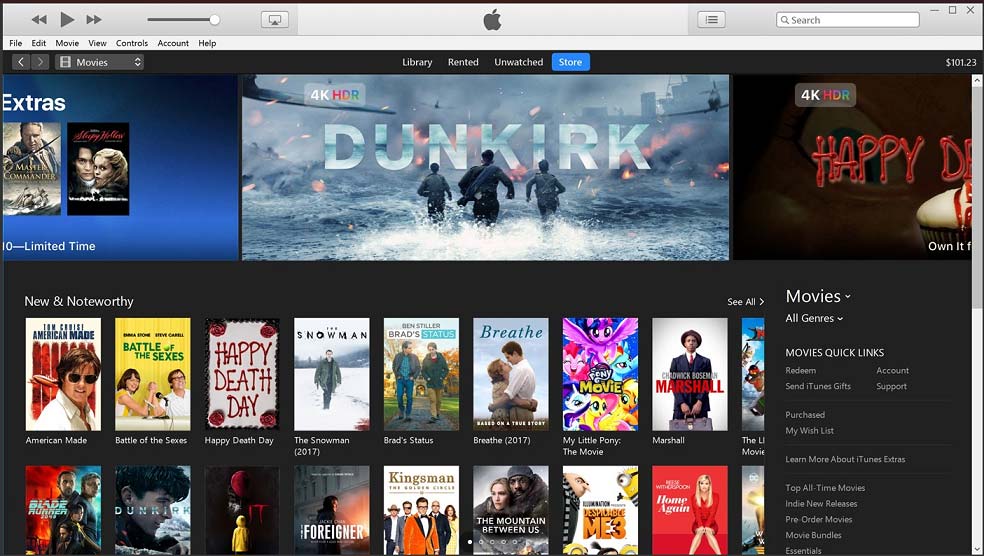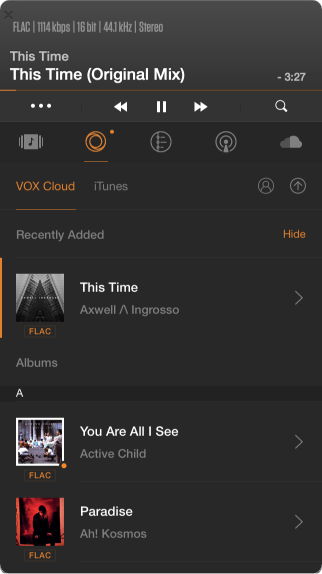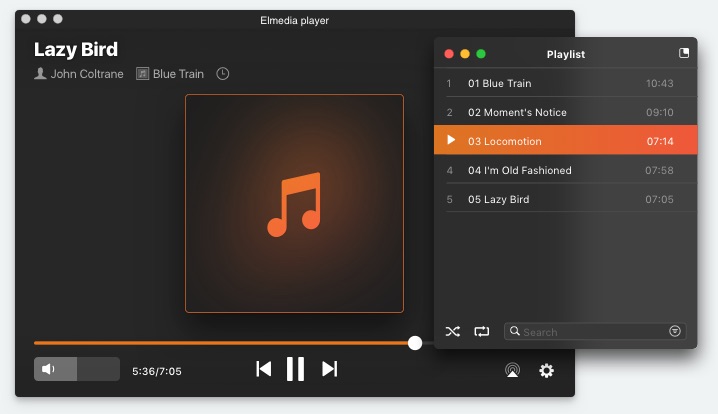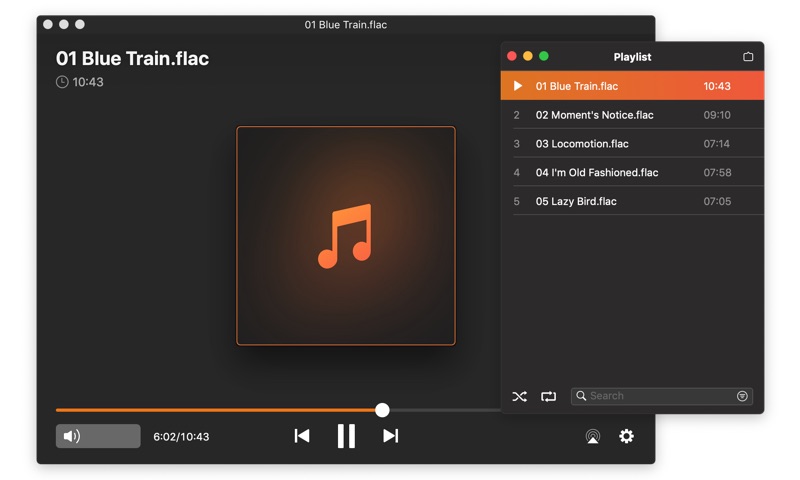#1 Music player for Mac OS and iOS with Unlimited Music Cloud Storage. Supports all popular audio formats like MP3, FLAC, AAC, WAV & more! With Audirvana your computer becomes a true high fidelity audio source. The audio playback becomes a priority on your computer, and your system (DAC) is fed with a ready-to-play audio data stream using the shortest possible path. A fresh install of macOS (formerly Mac OS X or OSX) does not have a convenient way of playing your FLAC files (although since High Sierra pressing the Spacebar in Finder does play FLAC files) as iTunes would. Which is the Best FLAC player for Mac? Strictly objective speak would define the best FLAC player on Mac as the one that works for you! Colibri is a Lossless Mac Music & Audio Player for Apple Mac macOS with BS2B support for multiple headphones, 10-band EQ (Peaking Equalizer), Gapless Playback and Bit-Perfect Stereo Balance. M4A, AAC, ALAC, MP3, MIDI, MOD, TTA, DSD, WV, CUE Sheets and other popular formats.

A native Mac audio and music player that supports crystal-clear bit-perfect gapless playback of all popular lossless and lossy audio formats, uses only a tiny amount of computing power and offers a clean and intuitive user experience – it only ‘does what it says on the can’.
macOS 10.10+ / 64-bit
Try the freeColibri DAC/DSD Test app
Saves your battery
Uses a barely noticable amount of computing power, Colibri is built using state-of-the-art Swift programming language while the BASS audio engine is bundled as machine code and the interface uses built-in components by Apple. This was done in order to achieve a tiny footprint and to be as native to macOS as humanly possible.
Plays your audio
Colibri supports the most widely used range of file formats in terms of lossless audio: FLAC, ALAC, WAV, AIFF, APE, TTA, DSD, WavPack, popular lossy formats: Ogg Vorbis, MP1/MP2/MP3 and AAC/M4A, network streams/online radio, MOD and MIDI files (with per song SoundFont support)! For your undisturbed listening pleasure, Colibri supports Exclusive/Hog mode as well. A lossless audio player at heart with love to other popular formats as well0010.
Handles CUE Sheets
Complete Cue sheet support: malformed and disordered content is reprocessed during loading along with a painless and quick way to add your whole collection – Colibri will analyze and decide whether to load the Cue sheet in the folder or queue every song one by one for every added/dragged folder recursively.
Supports gapless playback
Extensively designed from the ground-up to provide a true gapless listening experience. Colibri prepares the upcoming song for playback in the background to further eliminate gaps for (slower) external drives or network shares without pushing the entire song into memory, meaning that no extra CPU or RAM usage is needed!
Next-generation BS2B support

Individual Song & Audio Device Profiles
Custom Processing Order
Automatic Profile Switching
Picks up where you left off
Saves or empties your current playlist upon quitting and re-opens your songs when you start it up again. Furthermore, Colibri can also save and load its’ current playlist to a custom format that can even be appended to an already existing playlist. Loading and appending is also available for M3U and M3u8 playlist files.
Avoids most problems
Colibri does its’ best to avoid most problems before, during and even after playback. Loading unsupported files show up as an error message and files that have disappeared since loading are automatically removed and skipped upon being reached in the playlist. A Mac lossless player developed with flexibility and error correction in mind.
Understands your language
Capable of rendering the song information as it was intended to be shown: of all the tried metadata it had no problem with displaying Cyrillic or kanji/katakana/hiragana characters mixed with ASCII. All known metadata types readable by the BASS engine and macOS are supported by Colibri.
Respects your privacy
Colibri does not phone home, collect usage data, spy on you or modify files in any way. It also does not contain DRM routines, have features hidden behind a paywall or bind functions to a subscription model. Colibri is an audio player that respects your privacy to the fullest and this will never change.

10-band Peaking Equalizer
Individual Song Profiles
Automatic Profile Switching
Adjustable Bandwidth
Displays album art
Displays embedded cover art for FLAC files and ID3 / iTunes artwork metadata (mainly for ALAC / M4A and MP3 files). When that yields no visible results then Colibri looks around the folder where the current song resides for a cover art image and shows that. See the FAQ for details on the exact files Colibri looks for. FLAC files with embedded picture data or supplied album art images are displayed automatically.
Resides in your Menu Bar
Colibri can place an unobtrusively small icon in the Menu Bar for easy access and playlist control: you can either start/pause the playback, skip to the next track or go back to the previous one. It also displays the info and cover art image of the current song. Control Colibri from even multiple Spaces desktops away with the MenuBar Controller!
Integrates with Finder and your Keyboard
Colibri conforms all of Apple’s strict requirements – which means that it shows up in Finder as an option in “Open With” when a supported file is selected. Colibri can also open all files of a folder by opening just one of them from Finder – see the Settings – Behavior screenshots in the Gallery.
Adjusts to your Display
Colibri’s interface elements scale themselves nicely on every screen resolution and pixel density, while Colibri also offers a wide range of usage modes from small condensed to fullscreen complete with multiple types of column layouts and a resizable player window.
Colibri 1.9.1 Changelog
Thank you for using Colibri! This updates brings a bunch of bugfixes (codec errors, SoundFont usage, per-Song BS2B/EQ profiles, various crashes), eight new playlist columns (…and sorting for all!), a new ‘insert’ mode for the Playlist, switchable Auto-Play and Permanent Pause options – among other smaller enhancements. Happy listening!
ENHANCEMENTS
- Updated codebase to Swift 5
- Settings -> Output now better fits all kHz entries
- Volume is now automatically raised to 100% for DSD files when DoP/DoPA mode is selected and restored to previous volume level for non-DSD files (and PCM mode)
- Unsupported DST encoded DSD and DTS encoded WAV files will now show proper Unsupported Codec error messages
- added an alternate fallback method for Automatic Sample Rate Switching for stubborn DACs (Colibri uses it automatically when needed)
- Finder sorting order is used to enqueueing files to the Playlist
- Playlist will be rendered with system default monospace font when available (macOS 10.11 and up)
- added a ‘Use Default SoundFont’ option for MIDI files to the right-click context menu of the Playlist
- removing the default SoundFont will automatically set the next available SoundFont as the default
- if the SoundFont list is empty, then the first SoundFont will automatically be marked as the default
- removing a SoundFont only causes playback restart if the currently played song is affected by the removal
- importing a new SoundFont will automatically set it as the default
- new switchable option in Settings -> Playlist: “Dragging to the Playlist via Mouse / Trackpad”:
- songs will be added at pointer position (insert)
- songs will be added at the end of the list (append, like before)
- added ‘Permanent Pause’ to Settings -> Behavior (Off, by default):
- pause will ‘hold’ until the Play button is pressed again
- switching to a different song will ‘arm’/prepare the song for playback
- seeking repositions the playhead and it will play audio from the selected spot once unpaused
- removing songs from the playlist does not affect the paused state
- added ‘Auto-Play’ to Settings -> Behavior (On, by default):
- On: Colibri automatically plays the next song
- Off: Colibri stops when the current song ends
- Playlist Columns have been rewritten from scratch for improved stability: see Settings -> Columns
- Columns are now sortable:
- click on the header once to sort playlist by that column
- clicking once again switches between Ascending/Descending sorting
- sorting is supported across all columns
- added new Columns:
- Length, kHz, Codec, Year, Track Number, Disc Number, Composer and Bit Depth
- Playlist Columns can now have vertical and horizontal Grids:
- they help in finding the columns boundaries during reordering and resizing
- Grids can be toggled on/off in Settings -> Themes
- a color picker has been added to Settings -> Themes for the Grid
- new Loop option ‘Random Round Robin’ in Settings -> Playlist:
- each song in the Playlist will be played once per “round”
- when all songs were played once, a new “round” begins
- removing a song causes the “round”
- double-clicking on a song does not reset the “round”
- a great way to have a balanced, random playback order
- monospace system fonts are now used in both the Title bar and Status bar (10.11 and up)
BUGS FIXED IN THIS UPDATE
- Colibri would not display its’ name in the Force Quit and Activity Monitor windows
- Colibri would prevent the system from entering sleep state
- Colibri would fail to play the upcoming song under very high system load
- Playhead wouldn’t always continue from the same spot on output device change
- Playlist would have a weird glitch on startup
- Force Sample Rate would cause crash on startup
- Online Streams wouldn’t always start playback
- Random playback order would sometime cause Colibri to crash
- BS2B and EQ profiles wouldn’t property restore on next startup
- After starting Colibri, the playlist would become disorganized/chaotic if files had gone missing since last start
- Automatic Sample Rate Switching wouldn’t always switch properly after the end of the playlist had been reached
- Menubar Controller didn’t always refresh the data on song change
- some built-in Audio DSP hardware wouldn’t switch sample rate properly (mainly newer MacBook Pros)
- SoundFonts won’t always properly reload on next launch
- SoundFonts won’t properly switch on a per-song basis
- custom SoundFonts could disappear from the SoundFont list
- setting a custom SoundFont as default wouldn’t always save properly
- network streams won’t trigger a ‘Problem calculating song length’ error
- Menubar Controller properly shows Light/Dark control buttons as per system theme
- Colibri could crash by clicking on the EQ button while the Playlist is empty
- moving multiple songs in the Playlist at once could cause titles to be become disorganized
- dragging files / folder to the dock would not be added to the Playlist properly
- Colibri could crash on El Capitan 10.11.6 when switching between Dock and Menu modes
- added missing keyboard shortcut to DSD output mode menu
- About Colibri window didn’t properly switch the Light logo in Dark Mode
- Theme import / export buttons wouldn’t properly spawn the browser windows
- Pressing Return on an empty playlist could sometimes cause crash
- Pressing Return while nothing is selected in the playlist could cause crash
- Color Pickers in Settings -> Themes should now behave as expected of them
Thank you Henning Gärtner for all-around essential feedback and testing, Rick Ernsting for feedback on the SoundFont issues!
Colibri is the passion project of Gábor Hargitai, brought to you by countless sleepless and caffeine-induced nights.
Support Email: gabor@barefootwebdesign.co.nz
Watching the musical addictions of my friends, I increasingly note the increased popularity of lossless formats. Five years ago, it was hard to imagine, because the amount of disk space was quite expensive, and the data transfer rate was low.
The situation during this time has changed a lot. Modern iPhones now comes with a 256GB drive, and broadband penetrated the province. However, if you want to listen to music in lossless format on a Mac, you should know about some of the features that this article is dedicated to.

What is Lossless?

There are two types of audio compression: Lossy and Lossless.
Lossy compression is lossy compression. Files compressed by one of the Lossy formats take up less disk space and are transferred faster.
Lossless is a compression method in which the quality practically does not suffer or decreases imperceptibly. Music in Lossless formats is usually listened to with good equipment.
Read more: How to Convert FLAC to mp3 in macOS?
Play Flac on Mac
There are not many flac players that would allow playing files of all lossless formats for macOS. It remains either to convert lossless files from their formats to the Apple Lossless format and listen in iTunes, or install additional players.
Flac Player For Mac Os
VLC – does not need an introduction, many macOS users love it for the ability to view almost all video files. However, the program itself can also play lossless music. Supported formats are FlAC, Apple Lossless, Money Audio and others. Although VLC allows you to listen to lossless music without problems, it is inferior in terms of convenience to music players.
Making VLC play the FLAC file is very simple, just right-click on the file and select the line “Open with …” and select VLC from the list.
Player Flac For Mac Os Catalina
Lossless Formats
There are more than a dozen compression formats for audio files without loss of quality, but the following is worth stopping:
Flac On Mac
- FLAC is an audio codec that is distributed under the free GNU GPL license. This is one of the most famous lossless formats. Flip files cannot be played on iPod. You must either transcode the music to other formats, or reflash the iPod with third-party firmware (for example, Rockbox);
- WavPack is another open source coding format;
- Monkey’s Audio is a fairly popular encoding format, which is notable among other things for its free distribution, open source code, but under a proprietary license. Monkey’s Audio files have the extension .ape and .apl.
